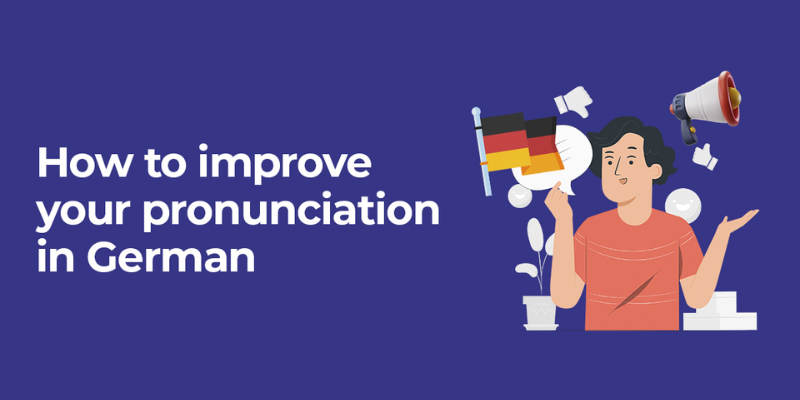
Learning to speak a new language can be challenging, especially when mastering pronunciation. For many learners, German pronunciation presents a unique set of hurdles due to its complex consonant sounds and distinct vowel pronunciation. However, improving your German pronunciation is entirely achievable with the right strategies and techniques. This blog will explore key methods to help you improve your German pronunciation, making you sound more natural and confident when speaking. Whether through self-study or a German Language Course in Chennai, you can effectively enhance your pronunciation skills.
German pronunciation differs significantly from English, with certain sounds and letter combinations that are uncommon for English speakers. For example, the “ü” and “ö” vowels, as well as the trilled “r,” can be tricky to master. The good news is that German pronunciation is relatively consistent, meaning once you learn the rules, you can apply them across most words. Improving your German pronunciation will not only enhance your communication skills but also help you sound more fluent and confident in conversation.
1. Master the German Alphabet
A strong foundation in the German alphabet is crucial for accurate pronunciation. While many letters in German are pronounced similarly to English, several key differences exist. For instance, the letter “w” is pronounced as a “v,” and the “v” sounds like “f.” Practice the alphabet and pay special attention to letters and sounds that are different from English. Listening to native speakers recite the alphabet and repeating after them can be an effective way to internalize these differences, just as attending Spoken English Classes Chennai can help with mastering nuances in English pronunciation.
2. Focus on Vowel Sounds
German vowels are pronounced with clarity and distinction. Unlike English, where vowels can have multiple pronunciations, German vowels are generally consistent. Learning the difference between long and short vowel sounds is critical. For example, the “a” in “Mann” (man) is short, while the “a” in “Maß” (measure) is long. Take time to practice the vowel sounds “ä,” “ö,” and “ü,” which don’t exist in English. These sounds can be tricky, but practicing with specific words that contain these vowels will help you improve.
3. Practice Consonant Combinations
German consonant combinations are another area where pronunciation can be challenging. Sounds like “sch,” “ch,” and “sp” require practice to pronounce correctly. For example, “sch” in words like “Schule” (school) is pronounced like the English “sh.” The “ch” sound can vary depending on the word; in “ich” (I), it’s a soft sound, but in “Bach” (brook), it’s pronounced more gutturally. Practice these combinations by listening to native speakers, repeating words that feature these sounds, or taking a Speaking English Course Near Me to improve your overall pronunciation skills.
4. Listen and Imitate Native Speakers
One of the most effective ways to improve your German pronunciation is by listening to native speakers and imitating them. Whether through German podcasts, videos, or movies, paying attention to how words are pronounced and repeating them will help you develop a natural-sounding accent. Try to focus on how native speakers emphasize certain syllables and practice mimicking their rhythm and intonation. You can also use language learning apps that provide audio examples and allow you to practice your pronunciation by comparing your speech to native speakers.
5. Work on Your Intonation and Stress Patterns
German intonation and stress patterns are crucial for clear communication. In German, the first syllable of most words is typically stressed. Miscommunication might occur as a result of incorrect stress placement. For instance, in the word “Familie” (family), the stress is on the second syllable (fa-MI-lie). Practicing stress patterns and sentence intonation will make your speech sound more natural. You can practice this by reading German texts out loud and focusing on where the natural stress falls within each word and sentence.
6. Use Phonetic Tools and Apps
Phonetic tools, such as the International Phonetic Alphabet (IPA), can help you break down the pronunciation of difficult words. By learning how words are transcribed in the IPA, you can get a clearer understanding of how to pronounce them. Additionally, there are numerous language apps, such as Duolingo, Babbel, and Memrise, that offer pronunciation exercises with immediate feedback. These tools can help you correct your mistakes and fine-tune your accent. If you’re looking to enhance your overall skills, consider enrolling in a German Classes Near Me, which can help you correct your mistakes and fine-tune your accent.
7. Take German Pronunciation Classes
If you’re struggling with pronunciation, taking a German language class or hiring a tutor can be highly beneficial. A teacher can give you personalized feedback, correct your mistakes, and guide you through difficult sounds. Many language schools offer courses focused specifically on pronunciation. Practicing with a teacher allows you to ask questions and receive immediate corrections, accelerating your progress.
Improving your German pronunciation may take time and practice, but with consistent effort and the right approach, it’s entirely possible to achieve a more natural, fluent accent. By mastering the German alphabet, focusing on vowel and consonant sounds, imitating native speakers, and using language tools and apps, you’ll notice significant progress. Additionally, working on your intonation, stress patterns, and seeking professional help when needed can ensure that your pronunciation continues to improve. Consider enrolling in Language Classes in Chennai for additional support and structured learning. With dedication, you’ll not only enhance your ability to communicate in German but also build confidence in your language skills.
